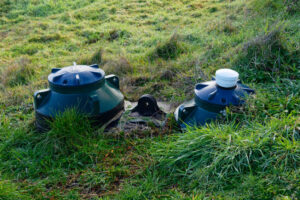 How much do you know about septic systems? If you’re like most people, you know very little. But, you’re here reading this, so it’s time to learn about septic systems so you’ve got more knowledge.
How much do you know about septic systems? If you’re like most people, you know very little. But, you’re here reading this, so it’s time to learn about septic systems so you’ve got more knowledge.
Septic Systems
With septic systems, there are septic tanks and leach fields. When water from your house leaves the house, it can go into a septic tank. That water can carry poop, pee, hair, soap and more– whatever goes down the toilet or down the drains in a house. Where does that water end up? If you’ve got a septic system, then it ends up in your septic tank, which is a concrete or stainless steel box buried underground about 10 feet (or more) away from the house. In this tank, bacterial action breaks down waste materials over time. Sewage products that get reduced to a liquid effluent are then transferred to the leach field where they get absorbed into the soil. All of this is done in an environmentally acceptable way.
Sometimes solid waste products don’t get reduced to liquid effluent so they’re still in the septic tank. When you’ve got “too much” of “that,” then it’s time to call a company like Carolina Septic Pro to come pump out the tank and dispose of “that” properly.
Leach Fields
Generally, liquid effluent gets to the leach field through a series of perforated pipes called laterals. The good news is this: contaminants get disposed of without contaminating the groundwater or endangering animals. Leach pipes are laid in trenches lined with gravel. There’s a layer of untreated building paper involved which acts as a soil filter, allowing the effluent to gradually be absorbed into the soil.
If you know where your leach field is on the property, don’t park a car on top of it. Meanwhile, it might be time to get your septic tank pumped out– most homeowners do so every couple years. Call Carolina Septic Pro for more information about that– 980-500-1022.
